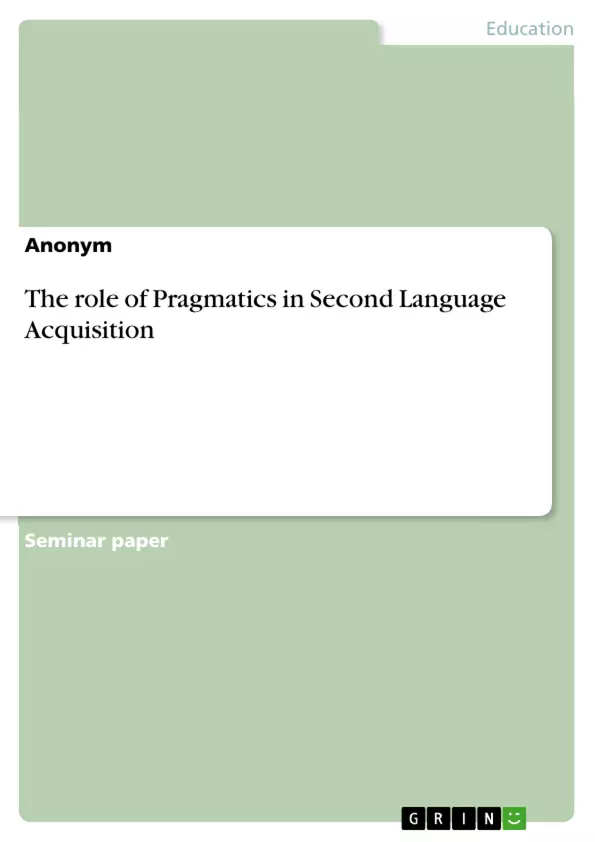This term paper will provide an overview of the field of pragmatics and its relation to second language acquisition (SLA). According to second language researchers, second language pragmatics has been neglected but is slowly turning into a growing area in the field of SLA. The study of pragmatics is now seen as a substantial contribution to language acquisition and therefore, fostering the pragmatic competence of learners has become an important factor in the second language classroom. Its increased importance is due to the perception that pragmatic competence is necessary for the purpose of not only understanding the target language, but also of being understood in the target language, which shows its beneficial impact on communication and consequently on SLA.
The structure of this term paper is as follows: the first part will consist of the definition of the terms ‘Pragmatics’ and ‘Second Language Acquisition’ and will illustrate each concept in order to demonstrate what exactly will be dealt with in this term paper. Afterwards, pragmatics will be viewed in relation to Second Language Acquisition to point out its importance for communicating successfully. Furthermore, the question whether pragmatic competence can be taught will be discussed. The fourth chapter will then deal with Krashen’s input hypothesis, Long’s interaction hypothesis and Swain’s output hypothesis, each of which will be analysed in a pragmatic context as approaches that foster pragmatic knowledge. The subsequent chapter will on the other hand present Chomsky’s universal grammar approach as an approach that makes it hard to practice pragmatic knowledge. The conclusion will summarize the findings and examine the advantages of pragmatics to point out its impact on communication as well as its role in second language acquisition.
Inhaltsverzeichnis (Table of Contents)
- Introduction
- Definition of Terms
- Pragmatics
- Second Language Acquisition
- Pragmatics in Second Language Acquisition
- What makes us pragmatically competent?
- Pragmatic knowledge and its impact on communication
- Can pragmatic competence be taught?
- Input, Interaction and Output in Second Language Acquisition
- Krashen's Input Hypothesis
- Long's Interaction Hypothesis
- Swain's Output Hypothesis
- Input, Interaction and Output in relation to pragmatics
- Chomsky's Universal Grammar approach in Second Language Acquisition
- Chomsky's Universal Grammar approach
- The Universal Grammar approach in relation to pragmatics
- Conclusion
Zielsetzung und Themenschwerpunkte (Objectives and Key Themes)
This term paper aims to provide a comprehensive overview of pragmatics and its significance in second language acquisition (SLA). It examines the importance of pragmatic competence for successful communication in the target language, exploring how pragmatic knowledge can be acquired and fostered.
- The definition and scope of pragmatics in relation to SLA
- The role of pragmatic competence in successful communication
- The impact of input, interaction, and output on pragmatic development
- The relationship between Chomsky's Universal Grammar and pragmatic competence
- The potential of teaching pragmatic competence in second language classrooms
Zusammenfassung der Kapitel (Chapter Summaries)
The paper begins by defining the key terms "Pragmatics" and "Second Language Acquisition," emphasizing the growing recognition of pragmatics within SLA research. It then explores the significance of pragmatic competence in communication, arguing that it is crucial not only for understanding but also for being understood in the target language. The paper examines various factors that contribute to pragmatic competence, including sociopragmatic and pragmalinguistic knowledge.
The subsequent chapters delve into the influence of input, interaction, and output on pragmatic development. They analyze Krashen's Input Hypothesis, Long's Interaction Hypothesis, and Swain's Output Hypothesis in relation to pragmatic learning. Finally, the paper examines Chomsky's Universal Grammar approach and its implications for the acquisition of pragmatic knowledge.
Schlüsselwörter (Keywords)
Pragmatics, second language acquisition, communicative competence, pragmatic competence, input hypothesis, interaction hypothesis, output hypothesis, Universal Grammar, sociopragmatics, pragmalinguistics, language learning.
- Arbeit zitieren
- Anonym (Autor:in), 2019, The role of Pragmatics in Second Language Acquisition, München, GRIN Verlag, https://www.hausarbeiten.de/document/1400811


